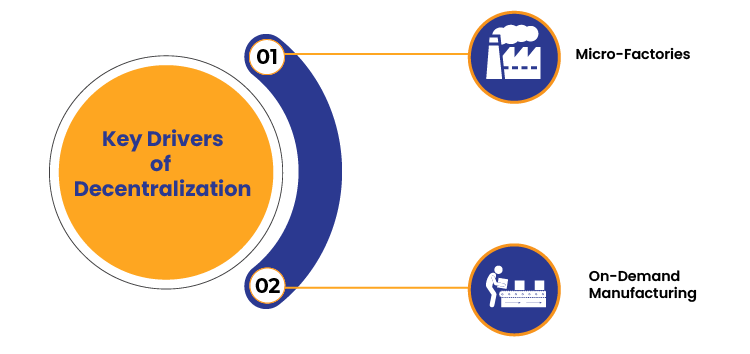

Neet Bhagat
7 Minutes read
Unlocking the Future of Manufacturing with Cloud-Enabled Decentralization
The COVID-19 pandemic exposed vulnerabilities in traditional, centralized manufacturing models. Global supply chain disruptions, labor shortages, and fluctuating demand made it clear that flexibility, agility, and resilience are paramount in the post-pandemic era. As a result, the manufacturing industry is shifting towards decentralized production models—hyper-local, agile, and often supported by advanced automation and cloud technologies.
Cloud platforms like AWS, Azure, and GCP are now integral to enabling decentralized manufacturing. By connecting micro-factories, local production units, and distributed supply chains, cloud technologies provide the infrastructure needed for real-time monitoring, data sharing, and decision-making at global scale. This shift to decentralized models is not only minimizing disruptions but also driving efficiency and responsiveness.
Decentralized Manufacturing: The New Paradigm
The decentralized manufacturing model centers around the idea of distributed production—where small, localized production units or micro-factories are set up close to the end consumer. This model drastically reduces transportation costs, increases responsiveness to market changes, and mitigates the impact of large-scale supply chain disruptions.

Key Drivers of Decentralization
Micro-Factories
Agile, small-scale factories that focus on producing specific products or parts near demand centers. These are often equipped with cloud-connected IoT systems for real-time production monitoring. Cloud services like AWS IoT Greengrass and Azure IoT Hub enable seamless integration of micro-factories with larger supply chain systems.
On-Demand Manufacturing
Leveraging cloud-based services to produce goods only when needed. This prevents overproduction and minimizes waste. Platforms like GCP’s Cloud Run support the scalability required for on-demand production by dynamically allocating compute resources as demand fluctuates.
Business Use Case: Apparel Industry
A leading global apparel retailer, for example, has adopted a micro-factory approach to produce limited-run, custom clothing lines closer to key markets. By deploying Azure Edge Zones, they achieve real-time design iterations, production changes, and immediate feedback loops with regional distribution hubs. The result is faster time-to-market and reduced transportation costs, all while responding to local consumer trends.
Cloud-Connected Micro-Factories: Scaling Responsiveness and Efficiency
Micro-factories are agile production environments, powered by cloud infrastructure, that bring flexibility to the manufacturing sector. These factories enable manufacturers to react to shifting demands, labor shortages, and supply chain issues without waiting for central production units to adapt. They rely on cloud-based digital platforms for automation, inventory management, and production control.
Cloud-Native Software in Micro-Factories
SAP Digital Manufacturing Cloud
Integrated with AWS, it provides real-time data visibility, predictive analytics, and automated decision-making. This enables micro-factories to optimize production schedules and reduce bottlenecks based on real-time demand fluctuations.
Edge Computing in Micro-Factories
Tools like AWS Outposts and Azure Stack Edge allow micro-factories to process data locally, ensuring low-latency control over machinery while syncing aggregated data with centralized cloud platforms for predictive analytics and supply chain coordination.
Use Case: Electronics Manufacturing
A multinational electronics company has decentralized its production using cloud-connected micro-factories. By deploying Kubernetes for containerized applications and using Azure IoT Edge, the company achieves dynamic load balancing across its global production sites. This decentralization strategy not only improves responsiveness to local market demand but also ensures uninterrupted production even when regional disruptions occur.
Cloud Platforms Enabling Hyper-Local Models
AWS Snow Family (Snowcone and Snowball)
Enables hyper-local data processing and logistics by providing edge devices that allow factories to operate independently in remote or distributed locations while syncing data with central cloud services when connectivity is available.
Google Cloud’s Anthos
A hybrid cloud platform that allows manufacturers to manage applications across on-prem, edge, and cloud environments, supporting the flexibility required for hyper-local production units.
Business Use Case: Automotive Manufacturing
A global automotive company adopted a hyper-local manufacturing strategy by deploying micro-factories powered by Google Cloud Anthos. By decentralizing production of key components to markets in Europe and North America, they were able to reduce supply chain lead times by 30%, improve customer delivery timelines, and lower costs associated with transporting goods from overseas.
Resilience Through Decentralization and Cloud-Enabled Flexibility
The combination of decentralization and cloud-based automation technologies ensures resilience, even in the face of significant global disruptions. Manufacturers are now leveraging AI-driven demand forecasting, real-time production analytics, and multi-cloud architectures to build flexible, resilient systems that can rapidly adapt to changing conditions.
AI for Demand Forecasting and Supply Chain Resilience
Cloud platforms provide manufacturers with access to AI-powered demand forecasting models that help anticipate shifts in market demand and align production capacity accordingly. Solutions like AWS Forecast or Azure Machine Learning enable manufacturers to gather insights from historical sales data, market trends, and consumer behavior, helping them adjust production schedules in real-time.
Multi-Cloud for Increased Redundancy
To ensure operational continuity, manufacturers are increasingly adopting multi-cloud strategies—leveraging the services of multiple cloud providers to build redundancy into their systems. For example, a manufacturer can use GCP’s BigQuery for large-scale data analytics while running critical IoT workloads on AWS IoT Greengrass. This approach minimizes the risk of downtime and ensures that production lines remain operational, even if one cloud service experiences an outage.
Business Use Case: Global Food & Beverage Industry
In the food and beverage industry, a large multinational has implemented multi-cloud infrastructure for their global production sites. Using Azure Kubernetes Service (AKS) for container orchestration and GCP Spanner for global database management, they ensure that production remains uninterrupted, regardless of localized disruptions, while maintaining real-time communication across distributed production units.
The Role of Digital Twins in Decentralized Manufacturing
In decentralized production, digital twins offer critical visibility into complex, distributed operations. By creating virtual models of production lines, equipment, and even entire factories, manufacturers can simulate, monitor, and optimize operations remotely.
Digital Twins for Resilience and Optimization
In decentralized manufacturing, digital twins not only provide real-time visibility but also enable simulation of different scenarios, such as supply chain bottlenecks or shifts in production demand. Azure Digital Twins and AWS IoT TwinMaker allow manufacturers to visualize production performance across geographically distributed facilities, ensuring consistent quality and efficiency.
Use Case: Aerospace Industry
An aerospace company, operating several global manufacturing facilities, uses Azure Digital Twins to synchronize production lines across continents. The digital twin technology allows them to simulate changes in production, predict potential issues, and coordinate repairs or updates across distributed locations, ensuring minimal downtime and optimized performance across their decentralized network.
Conclusion: Decentralization and Cloud as the Future of Manufacturing
The future of manufacturing lies in decentralized, resilient models that leverage the full potential of cloud technology. By adopting micro-factories, hyper-local production, and multi-cloud architectures, manufacturers can mitigate the risks associated with traditional supply chain dependencies, improve responsiveness to regional demand, and enhance operational flexibility.
Cloud platforms like AWS, Azure, and GCP provide the underlying infrastructure that enables this shift. From real-time production monitoring and digital twins to AI-powered demand forecasting and edge computing, cloud technologies are equipping manufacturers with the tools they need to thrive in a decentralized and unpredictable world.
ACLDigital’s cloud consulting expertise can guide manufacturers through this transformation, helping them implement scalable, flexible solutions that unlock new efficiencies and ensure long-term resilience.
For the latest updates or additional information, feel free to contact ACL Digital.



